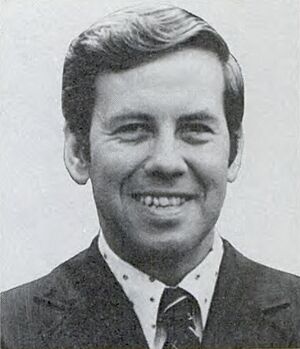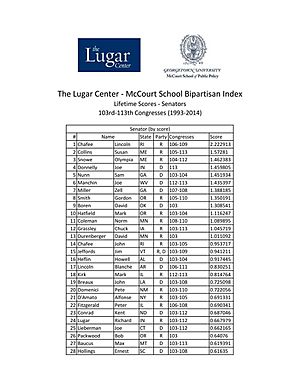Richard Lugar facts for kids
Quick facts for kids
Dick Lugar
|
|
|---|---|
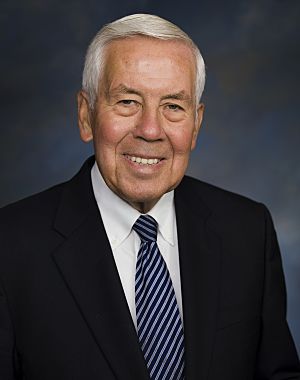 |
|
| United States Senator from Indiana |
|
| In office January 3, 1977 – January 3, 2013 |
|
| Preceded by | Vance Hartke |
| Succeeded by | Joe Donnelly |
| Chair of the Senate Foreign Relations Committee | |
| In office January 3, 2003 – January 3, 2007 |
|
| Preceded by | Joe Biden |
| Succeeded by | Joe Biden |
| In office January 3, 1985 – January 3, 1987 |
|
| Preceded by | Chuck Percy |
| Succeeded by | Claiborne Pell |
| Chair of the Senate Agriculture Committee | |
| In office January 20, 2001 – June 6, 2001 |
|
| Preceded by | Tom Harkin |
| Succeeded by | Tom Harkin |
| In office January 4, 1995 – January 3, 2001 |
|
| Preceded by | Patrick Leahy |
| Succeeded by | Tom Harkin |
| 44th Mayor of Indianapolis | |
| In office January 1, 1968 – January 1, 1976 |
|
| Preceded by | John Barton |
| Succeeded by | William Hudnut |
| Personal details | |
| Born |
Richard Green Lugar
April 4, 1932 Indianapolis, Indiana, U.S. |
| Died | April 28, 2019 (aged 87) Falls Church, Virginia, U.S. |
| Resting place | Arlington National Cemetery |
| Political party | Republican |
| Spouse |
Charlene Smeltzer
(m. 1956) |
| Children | 4 |
| Education | Denison University (BA) Pembroke College, Oxford (BA, MA) |
| Signature | |
| Military service | |
| Allegiance | |
| Branch/service | |
| Years of service | 1957–1960 |
| Rank | |
Richard Green Lugar (born April 4, 1932 – died April 28, 2019) was an American politician. He served as a United States Senator for Indiana from 1977 to 2013. He was a member of the Republican Party.
Lugar was born in Indianapolis. He studied at Denison University and the University of Oxford. Before becoming a senator, he was a member of the Indianapolis Board of School Commissioners. He then served two terms as mayor of Indianapolis from 1968 to 1976. As mayor, he led the National League of Cities and gave a major speech at the 1972 Republican National Convention.
In 1976, Lugar was elected to the U.S. Senate. He was reelected five more times, serving a total of 36 years. A big part of his work in the Senate was focused on getting rid of nuclear, biological, and chemical weapons around the world. He co-sponsored the important Nunn–Lugar Act with Democrat Sam Nunn.
After leaving the Senate, Lugar started a group called The Lugar Center. This organization works on the same policy areas he focused on during his time in office.
Contents
Early Life and Education
Richard Lugar was born in Indianapolis, Indiana, on April 4, 1932. His parents were Bertha and Marvin Lugar. He went to public schools in Indianapolis.
As a young person, he achieved the rank of Eagle Scout, which is the highest honor in the Boy Scouts of America. He later received the Distinguished Eagle Scout Award. He graduated at the top of his class from Shortridge High School in 1950.
Lugar then went to Denison University, graduating in 1954. He was a Rhodes Scholar at Pembroke College, Oxford, in England. There, he earned two more degrees by 1956. While at Oxford, he was part of the men's basketball team that won a national championship in 1955.
He served in the United States Navy from 1956 to 1960. He was an intelligence briefer for Admiral Arleigh Burke. He reached the rank of Lieutenant, Junior Grade. Before entering politics, he helped manage his family's farm and food machinery business.
Mayor of Indianapolis
Lugar started his public service on the Indianapolis Board of School Commissioners from 1964 to 1967. In 1967, at age 35, he was elected mayor of Indianapolis. He served two terms, starting in 1968.
A major achievement during his time as mayor was the adoption of Unigov in 1970. This plan combined the governments of Indianapolis and Marion County. Unigov helped Indianapolis grow economically. This success led to Lugar becoming president of the National League of Cities in 1971. In 1972, he was a main speaker at the Republican National Convention.
U.S. Senate Career
Senate Elections
Lugar first tried to become a U.S. Senator in 1974 but lost. Two years later, in 1976, he ran again and won by a large margin against the sitting Democratic Senator, Vance Hartke.
He was reelected five more times: in 1982, 1988, 1994, 2000, and 2006. He was the first U.S. Senator from Indiana to be elected to a fourth term. In 2006, he won with a very high percentage of votes, even though the Democratic Party did not have a candidate against him.
In 2012, Lugar ran for a seventh term. However, he was challenged by Richard Mourdock in the Republican primary election. Many Tea Party voters did not like some of Lugar's positions, such as his votes to confirm Supreme Court nominees Sonia Sotomayor and Elena Kagan. Mourdock defeated Lugar, ending his 36 years in the U.S. Senate. Lugar was the first six-term U.S. Senator to lose his seat in a primary election since 1952.
Key Work in the Senate
Lugar served as Chairman of the Senate Committee on Foreign Relations twice: from 1985 to 1987 and from 2003 to 2007. He also chaired the Senate Committee on Agriculture, Nutrition and Forestry from 1995 to 2001 and briefly in 2001.
Much of Lugar's work focused on global security. He worked to dismantle nuclear, biological, and chemical weapons around the world. His most famous law was the Nunn–Lugar Act, which he created with Democrat Sam Nunn. This law helped former Soviet Union countries get rid of their weapons of mass destruction.
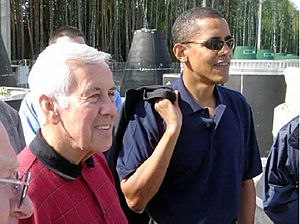
In 2005, Lugar and then-Senator Barack Obama visited Russia, Azerbaijan, and Ukraine to inspect nuclear facilities. In 2007, President Bush signed the Lugar–Obama Proliferation and Threat Reduction Initiative into law. This continued Lugar's work to deactivate weapons in the former Soviet Union and focus on preventing terrorists from getting these weapons.
Lugar was known for working well with members of both parties. He had good relationships with President Obama and Vice President Joe Biden, even though he was a Republican and they were Democrats.
Committee Assignments
- Committee on Agriculture, Nutrition, and Forestry
- Committee on Foreign Relations
1996 Presidential Campaign
Lugar ran for the Republican nomination for President in 1996. He announced his campaign in April 1995. His campaign focused on "nuclear security and fiscal sanity."
However, his campaign did not gain much support. He finished low in the early primary elections and caucuses. He left the race in March 1996 and supported his fellow senator, Bob Dole, who became the Republican nominee. Lugar did not win any states or delegates in the election.
After the Senate
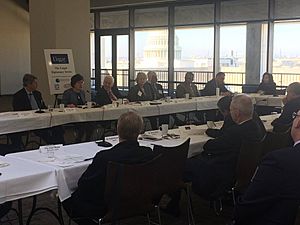
After leaving the Senate, Richard Lugar founded The Lugar Center. This is a non-profit organization in Washington, D.C., that focuses on public policy.
The Lugar Center works on important global issues that Lugar cared about. These include:
- Global Food Security
- Stopping the spread of weapons of mass destruction (WMD Nonproliferation)
- Making foreign aid more effective
- Encouraging bipartisan governance (working across political parties)
The Center also created the Bipartisan Index with Georgetown University. This index measures how often members of Congress work together across party lines.
Political Views
Agricultural Reform
As Chairman of the Agriculture Committee, Lugar helped pass reforms to federal farm programs in 1996. He also supported research into biofuels like ethanol. He worked to make the U.S. Department of Agriculture more efficient and to reform food assistance programs.
Working Across Parties
Lugar was known for working with Democrats, even though he was a Republican. This was especially true on international issues. His most famous law, the Nunn–Lugar Cooperative Threat Reduction Agreement, was co-sponsored with a Democratic Senator. The Lugar Bipartisan Index, created by his center, showed his strong record of working with both parties.
Climate Change
Lugar believed in using science to solve climate change issues. In 2006, he worked with then-Senator Joe Biden on a resolution to encourage American involvement in international agreements about climate change. He continued to support global efforts for clean energy technology.
Cuba Policy

Lugar thought that U.S. sanctions against Cuba were not working. He supported lifting restrictions on U.S. citizens traveling to Cuba, which had been in place since the 1960s.
Economy
Lugar had a conservative view on economics. He voted for tax cuts in 2001. He voted against the American Recovery and Reinvestment Act of 2009, which was a plan to boost the economy during a recession.
Gun Control
Lugar supported some gun control measures and weapon bans. He received low ratings from gun rights groups like the National Rifle Association and high ratings from groups that support gun control.
Health Care Reform
Lugar opposed President Barack Obama's health care reform laws. He voted against the Patient Protection and Affordable Care Act in 2009 and the Health Care and Education Reconciliation Act of 2010.
Immigration
Lugar generally had a more open view on immigration. He supported the DREAM Act during the Obama administration and the McCain–Kennedy Comprehensive Immigration Reform bill during the Bush administration. These bills aimed to provide a path to legal status for some undocumented immigrants.
Iraq War
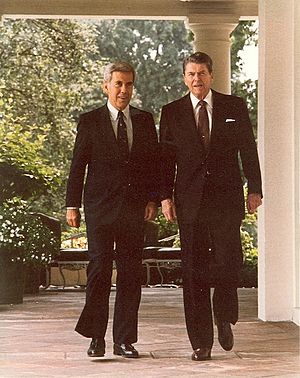
In 2007, Lugar stated that President Bush's strategy in Iraq was "not working." He suggested that the United States should reduce its military involvement. This was significant because Lugar had usually supported President Bush on the war.
Judicial Nominees
Lugar believed that decisions about confirming judges should not be based only on political parties. He thought that if a nominee was qualified, the Senate should usually confirm them.
He supported President George W. Bush's nominee for chief justice, John Roberts. Lugar also supported President Barack Obama's Supreme Court nominees, Sonia Sotomayor and Elena Kagan. He was one of only a few Republican Senators to do so.
LGBT Issues
Lugar held socially conservative views on LGBT issues. He voted for the Federal Marriage Amendment, which aimed to define marriage as only between one man and one woman. However, he also voted for the Matthew Shepard and James Byrd, Jr. Hate Crimes Prevention Act, which expanded hate crime laws to include sexual orientation and gender identity. In 2010, he voted against repealing the "Don't Ask, Don't Tell" policy, which prevented gay and lesbian people from serving openly in the military.
Middle East Policy
In 1986, Lugar supported a proposed arms sale to Saudi Arabia. He warned other senators that opposing it would weaken President Reagan's role in Middle East peace efforts. In 2012, Lugar called for the U.S. and Russia to work together to eliminate chemical weapons in Syria.
Nuclear Stockpile Reduction
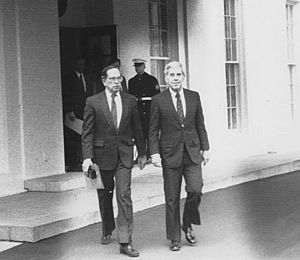
Lugar was very important in getting treaties approved that aimed to reduce the world's nuclear, chemical, and biological weapons. In 1991, he started the partnership with Senator Sam Nunn to eliminate weapons of mass destruction in the former Soviet Union. This program, called Nunn–Lugar Cooperative Threat Reduction, has deactivated thousands of nuclear warheads.
Pakistan Relations
In 2008, Lugar and Joe Biden received an award from the government of Pakistan for their support of the country. They also proposed a plan to provide $1.5 billion in aid per year to help Pakistan's economic development.
Other International Achievements
Senator Lugar supported Nelson Mandela's fight against South African apartheid. When President Reagan vetoed economic sanctions against South Africa, Lugar helped lead the effort to overturn the veto. He also played a role in the fall of the Marcos government in the Philippines.
Lugar also helped create the Cardin–Lugar Amendment. This law requires U.S.-listed oil and mining companies to report their payments to governments. This helps prevent corruption in countries with natural resources.
Awards and Honors
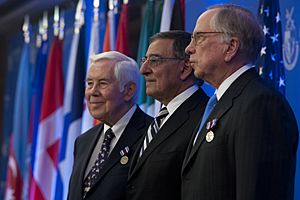
Lugar received many awards throughout his life. In 2010, he received the Benjamin Harrison Presidential Site Advancing American Democracy Award. In 2012, he was honored by the President of the Philippines and received Poland's Knight of Freedom Award for his support of Poland joining NATO.
On August 8, 2013, President Barack Obama announced that Lugar would receive the Presidential Medal of Freedom. This is the highest civilian award in the United States.
He was also made an honorary Knight Commander of the Order of the British Empire (KBE) by the United Kingdom for his work on reducing weapons of mass destruction and supporting NATO. Germany also honored him for his work on transatlantic cooperation. In 2016, the President of Ukraine awarded him the Order of Liberty.
Other Activities
Lugar was a member of the Rotary Club of Indianapolis and was named "Rotarian of the Century" in 2013. He also served on the board of directors for the National Endowment for Democracy and the Nuclear Threat Initiative (NTI), organizations focused on promoting democracy and reducing global threats.
Richard G. Lugar Center for Public Health Research
A biological research facility in Tbilisi, Georgia, is named after Lugar. This is to honor his efforts to reduce nuclear, chemical, and biological weapons around the world. The Richard G. Lugar Center for Public Health Research is a facility funded by the U.S. to contain dangerous germs and support international research. It helps stop diseases like plague from spreading globally.
Lugar worked with Georgia through the Nunn–Lugar Cooperative Threat Reduction Program. This program helped former Soviet Union states safely get rid of their weapons of mass destruction after the Cold War. The goal was to improve safety, security, and disease tracking.
The facility was renamed in 2012 and is run by Georgia's National Center for Disease Control and Public Health (NCDC). U.S. scientists from the Centers for Disease Control and Prevention (CDC) also work there with their Georgian colleagues.
Personal Life and Death
Lugar married Charlene Smeltzer on September 8, 1956. They had four sons. He was a member of the United Methodist Church.
Richard Lugar died on April 28, 2019, at the age of 87, in Falls Church, Virginia. He was buried in Arlington National Cemetery.
Legacy
Many people consider the Nunn–Lugar Cooperative Threat Reduction program to be Lugar's most important legislative achievement. It is seen as one of the most important programs ever for stopping the spread of dangerous weapons.
After Lugar lost his Senate seat in 2012, some people saw it as a sign that the Republican Party was becoming less open to working across the aisle. However, others believed his defeat might have simply been due to the desire for new leadership.
In 2019, the U.S. Navy announced that a new guided missile destroyer, the USS Richard G. Lugar (DDG-136), would be named in his honor. In Indianapolis, a city park and a public housing building are named after him. The School of Global & International Studies at Indiana University was also renamed to honor Lugar and former U.S. Congressman Lee Hamilton.
Images for kids
See also
 In Spanish: Richard Lugar para niños
In Spanish: Richard Lugar para niños
 | Janet Taylor Pickett |
 | Synthia Saint James |
 | Howardena Pindell |
 | Faith Ringgold |


